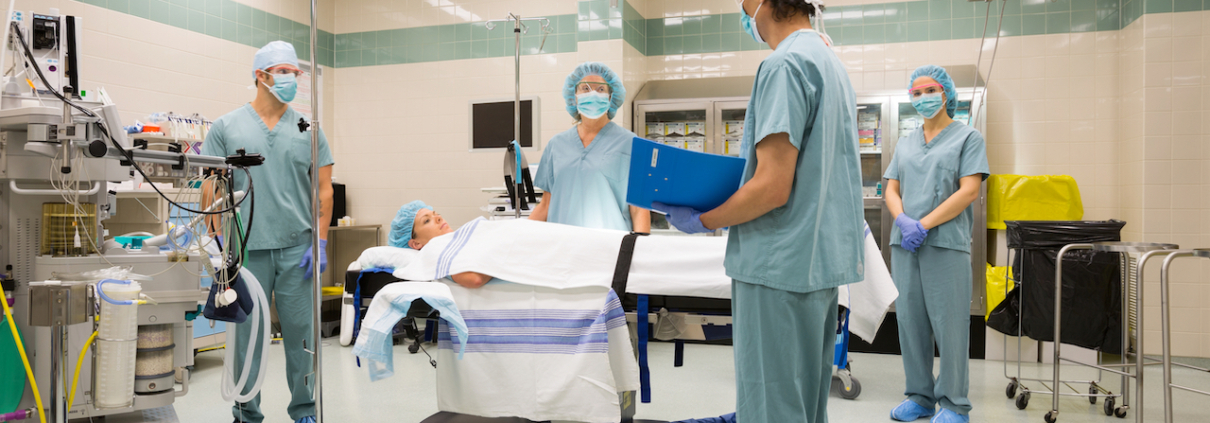Green Theatre Checklist Explained – How to Make Your Theatre More Environmentally Friendly
The Intercollegiate Green Theatre Checklist was developed by a number of UK and Ireland surgical colleges. It provides some guidelines for how operating theatres can cut down on their carbon emissions and work towards sustainability in healthcare.
In this post we’ll provide an essential overview of the Green Theatre Checklist, and the guidance it contains.
A Brief Introduction to the Green Theatre Checklist
Studies show that surgery is a carbon intensive process. A single operation is estimated to generate up to 170kgCO2e, which is about the same as driving 450 miles in a petrol car.
The Green Theatre Checklist is divided into four sections:
- Anaesthetic care
- Surgery preparation
- Intraoperative practice
- Postoperative measures
Each section contains a number of guidelines and policies to support surgical teams in working towards better environmental, social, and economic impacts.
How To Make Operating Theatres More Environmentally Friendly
Below we’ll provide a quick overview of the guidelines contained within each section of the Green Theatre Checklist.
Anaesthetic Care
- Source anaesthesia from your local area wherever possible.
- Limit your Nitrous Oxide use to specific cases, and regularly check your equipment for possible leaks.
- For inhalation anaesthesia, use sevoflurane instead of isoflurane, as it has a lower “global warming potential”.
- Switch to reusable equipment wherever possible (such as laryngoscopes, underbody heaters, slide sheets, and trays.)
- Minimise your drug waste. Introduce the policy: “Don’t open it unless you need it.”
Surgery Preparation
- Switch to reusable textiles wherever possible, including theatre hats, sterile gowns, patient drapes, and trolley covers.
- Reduce your water and energy consumption. Install automatic or pedal controlled water taps and adopt a “rub not scrub” approach: After your first water scrub of the day, use alcohol rub for all subsequent hand hygiene procedures.
- Avoid clinically unnecessary interventions, such as the use of antibiotics and catheterisation.
Intraoperative Practice
- Review and rationalise your surgeon preference lists, your single-use surgical packs, and your instrument sets. In each case, separate the essential vs. the optional, identify the surplus, and only open what you need when you need it.
- Avoid any unnecessary equipment, again taking the approach: “Don’t open it unless you need it.”
- Switch to reusable, hybrid, or remanufactured equipment wherever possible.
- Switch to low carbon alternatives wherever appropriate (e.g., skin sutures instead of clips).
Postoperative Measures
- Recycle wherever possible or use the lowest carbon appropriate waste streams. Use domestic or recycling waste streams for all packaging and use the non-infectious waste streams unless there’s a clear risk of infection.
- Encourage active equipment maintenance and aim to repair damaged reusable equipment rather than replacing it.
- When the theatre’s not in use, turn off all lights, computers, ventilation, and temperature control.
Access the Full Green Theatre Checklist
For more, you can access and download the full Intercollegiate Green Theatre Checklist.
Disclaimer – Infection Control Procedures
Bear in mind that these are just suggestions. They should not override your existing policies and procedures.
For example, working towards a green theatre should not come at the expense of infection prevention and control. Standard Infection Control Precautions and most PPE guidelines stress the importance of using disposable products so as to reduce the chances of cross-infection.
In this way, the Green Theatre Checklist seems to contradict infection control guidelines, as the checklist recommends switching to reusable equipment wherever possible.
As an operating theatre manager, you’ll have to carry out a thorough risk assessment so as to ensure that none of your Green Theatre policies compromise your infection prevention and control measures.
Help for Operating Theatre Managers
At Cairn Technology, we specialise in helping operating theatre managers improve efficiency, surgical outcomes, and staff and patient safety.
Find out more about our products and services for hospitals.
Or why not get in touch to talk to one of our experts today.



